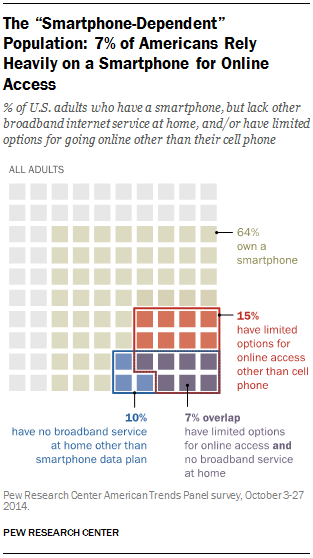The fox knows many things, but the hedgehog knows one big thing. Start here: https://bayesianfox.blogspot.com/2010/12/genesis.html
Friday, March 27, 2020
UBI(A): Universal Broadband Internet Access
One thing made clear from all this homeschooling is the need for internet access. On an Econtalk episode with Tyler Cowen, he and Russ Roberts discuss how social distancing might change society. We might find it more efficient to continue to work and learn remotely. If this trend continues, that means that guaranteeing public education for all children would have to guarantee internet access.
According to the FCC, 6 percent of US households do not have broadband access. That seems small (this says says 60 million, which would be 18 percent), but I can already give anecdotal stories from my father who teaches a community college course to working adults who never completed high school. One of his students has to go to McDonald's to send email. Now that restaurants are closed, I don't know what he's doing.
So why not subsidize?
This article in Reason shows that Lifeline, a federal program that subsidizes telephone and broadband internet service for low-income Americans, has been handing out subsidies to dead people. So efficiency and accountability might be an issue. One critique of Lifeline is that it offers the choice of a smartphone (remember Obama phones?) or internet access and most people choose the former. It's a harder sell to tell people that cell phones are a human right.
So is internet access even a problem? Here's some good news: Pew shows that internet usage is up dramatically. Even 66 percent of citizens without a high school diploma are on the internet. However, many of them are dependent on their smartphone for access, which isn't conducive to things like online learning.
This report shows that "19% of Americans rely to some degree on a smartphone for accessing online services and information and for staying connected to the world around them — either because they lack broadband at home, or because they have few options for online access other than their cell phone." (this might be where that earlier link gets their 18 percent number from.)
So even if we hand out Chromebooks to every student in America, an unacceptable number of them (roughly one out of five) won't be able to log into their teacher's learning portal.
It isn't just about affordability. Many rural communities don't even have the option to purchase broadband. It's often too expensive, meaning too little ROI, for private companies to build in rural areas. They get more money by setting up shop in denser, wealthier neighborhoods and profiting off that sweet monopoly money.
A growing trend is local communities building their own Internet networks. This interactive map shows you where.
Reason looked at a University of Pennsylvania study which examined 20 city-owned broadband networks around the country whose profitability could be gauged, 11 of which are operating at a loss.
They also link to an interactive map of 200 municipal networks showing that 14 have failed while another 50 remain mired in over $1 million in debt. In total that's 64 out of 200, so ... most of them work just fine?
I get it, libertarian-leaning Reason, there will be efficiency problems if we choose government over private business. But the status quo is leaving a lot of people out in the (virtual) cold and, if you believe in meritocracy, these people should be given a chance to prove their worth. Especially when the market is not providing them with that chance.
Instead of framing broadband internet access as an argument about it being a right vs. a luxury, it should be viewed as an extension of education, pre market and post market (an idea explained in my review of The Third Pillar).
Better yet, it should be thought of as an investment in human capital. We should make it easy for people to apply for jobs online, take online courses, become auto didacts via edX, or, hell, even Wikipedia.
We guarantee everyone a basic education, which doesn't seem to be doing much these days. At the very least we should guarantee them the chance to compete with an increasingly online world.
Subscribe to:
Post Comments (Atom)

No comments:
Post a Comment